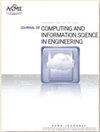Prognostics and Health Management of Unmanned Surface Vessels: Past, Present, and Future
IF 2.6
3区 工程技术
Q2 COMPUTER SCIENCE, INTERDISCIPLINARY APPLICATIONS
Journal of Computing and Information Science in Engineering
Pub Date : 2024-05-08
DOI:10.1115/1.4065483
引用次数: 0
Abstract
With the increasing popularity and deployment of unmanned surface vessels (USVs) all over the world, prognostics and health management (PHM) has become an indispensable tool for health monitoring, fault diagnosis, health prognosis, and maintenance of marine equipment on USVs. USVs are designed to undertake critical and extended missions, often in extreme conditions, without human intervention. This makes the USVs susceptible to equipment malfunction, which increases the probability of system failure during mission execution. In fact, in the absence of any crew onboard, system failure during a mission can create a great inconvenience for the concerned stakeholders, which compels them to design highly reliable USVs that must have integrated intelligent PHM systems onboard. To improve mission reliability and health management of USVs, researchers have been investigating and proposing PHM-based tools or frameworks that are claimed to operate in real time. This paper presents a comprehensive review of the existing literature on recent developments in PHM-related studies in the context of USVs. It covers a broad perspective of PHM on USVs, including system simulation, sensor data, data assimilation, data fusion, advancements in diagnosis and prognosis studies, and health management. After reviewing the literature, this study summarizes the lessons learned, identifies current gaps, and proposes a new system-level framework for developing a hybrid (offline-online) optimization-based PHM system for USVs in order to overcome some of the existing challenges.无人水面舰艇的诊断和健康管理:过去、现在和未来
随着无人水面舰艇(USV)在全球的日益普及和部署,预报和健康管理(PHM)已成为对 USV 上的海洋设备进行健康监测、故障诊断、健康预报和维护的不可或缺的工具。USV 的设计目的是在没有人工干预的情况下,往往在极端条件下执行关键和长时间的任务。这使得 USV 容易出现设备故障,从而增加了任务执行期间系统故障的概率。事实上,在没有任何船员的情况下,任务期间的系统故障会给相关利益方带来极大的不便,这就迫使他们设计高可靠性的 USV,必须在船上配备集成的智能 PHM 系统。为了提高 USV 的任务可靠性和健康管理,研究人员一直在研究和提出基于 PHM 的工具或框架,并声称这些工具或框架可实时运行。本文全面回顾了 USV PHM 相关研究的最新进展。它涵盖了 USV PHM 的广泛视角,包括系统仿真、传感器数据、数据同化、数据融合、诊断和预后研究的进展以及健康管理。在回顾文献后,本研究总结了经验教训,找出了当前的差距,并提出了一个新的系统级框架,用于开发基于优化的 USV 混合 PHM 系统(离线-在线),以克服现有的一些挑战。
本文章由计算机程序翻译,如有差异,请以英文原文为准。
求助全文
约1分钟内获得全文
求助全文
来源期刊
CiteScore
6.30
自引率
12.90%
发文量
100
审稿时长
6 months
期刊介绍:
The ASME Journal of Computing and Information Science in Engineering (JCISE) publishes articles related to Algorithms, Computational Methods, Computing Infrastructure, Computer-Interpretable Representations, Human-Computer Interfaces, Information Science, and/or System Architectures that aim to improve some aspect of product and system lifecycle (e.g., design, manufacturing, operation, maintenance, disposal, recycling etc.). Applications considered in JCISE manuscripts should be relevant to the mechanical engineering discipline. Papers can be focused on fundamental research leading to new methods, or adaptation of existing methods for new applications.
Scope: Advanced Computing Infrastructure; Artificial Intelligence; Big Data and Analytics; Collaborative Design; Computer Aided Design; Computer Aided Engineering; Computer Aided Manufacturing; Computational Foundations for Additive Manufacturing; Computational Foundations for Engineering Optimization; Computational Geometry; Computational Metrology; Computational Synthesis; Conceptual Design; Cybermanufacturing; Cyber Physical Security for Factories; Cyber Physical System Design and Operation; Data-Driven Engineering Applications; Engineering Informatics; Geometric Reasoning; GPU Computing for Design and Manufacturing; Human Computer Interfaces/Interactions; Industrial Internet of Things; Knowledge Engineering; Information Management; Inverse Methods for Engineering Applications; Machine Learning for Engineering Applications; Manufacturing Planning; Manufacturing Automation; Model-based Systems Engineering; Multiphysics Modeling and Simulation; Multiscale Modeling and Simulation; Multidisciplinary Optimization; Physics-Based Simulations; Process Modeling for Engineering Applications; Qualification, Verification and Validation of Computational Models; Symbolic Computing for Engineering Applications; Tolerance Modeling; Topology and Shape Optimization; Virtual and Augmented Reality Environments; Virtual Prototyping
文献相关原料
| 公司名称 | 产品信息 | 采购帮参考价格 |
|---|

 求助内容:
求助内容: 应助结果提醒方式:
应助结果提醒方式:


